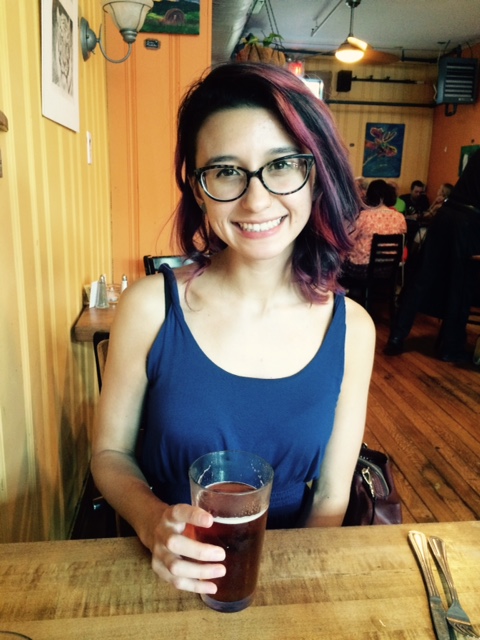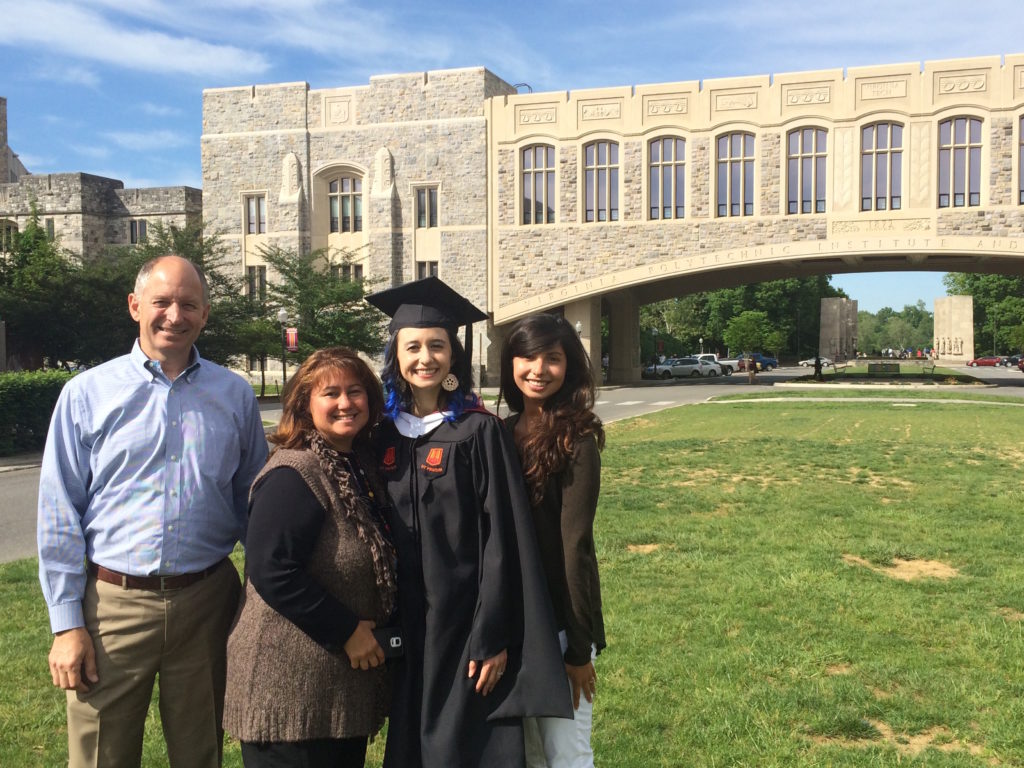Welcome to this week’s Womanly Wednesday! In this series, different women share their struggles, bravely opening up about their stories so that other people would be inspired and encouraged. Make sure to check out the Womanly Wednesday archives to read other posts from this series!
Growing up, I don’t think I knew I was depressed even though all of the signs were there. In middle school, I begged my mom to let me stay home even though I loved school and learning. I would come home, go to my room, and just cry. I remember always feeling alone and sad, but I never wanted to talk to anyone about it because they would ask why, and I wouldn’t have an answer. In my mind, I had no reason to feel the way I did. On the rare occasion when I did talk about it, I usually got one of two answers: 1) Happiness is a choice, or 2) It will pass. And so I took the “fake it ‘til you make it” route. I didn’t know I would be faking happy for the next decade and a half.

College was more of the same. I buried myself in my schoolwork, and although I was busy to the point of exhaustion, at least I wasn’t feeling like ending it all. But some months, my depression was constant. I would go to bed sobbing and wake up to find that sleep no longer cleared my mind. During the months when the clouds had lifted, I thought that maybe this was finally the end, and that maybe I really was okay. It always came back.
Since high school, I wrestled with God over my depression. I wondered why He allowed me to be depressed. I remember begging God to help me, and I remember feeling disappointed and angry when nothing changed. I looked up every verse in the Bible that talked about depression, trying to hold on to anything I could find that would justify the way I felt. I settled on thinking that my depression was a trial and God was testing me like He tested Job.
After college, I stayed busy. I moved up to Northern Virginia, participated in a church fellowship program, moved to Arlington, held two different jobs, got married, moved two more times, started graduate school, and bought a house. I was mostly unaware that I kept myself busy, but I began to notice that if I was alone for too long, I would end up curled up in a ball crying on the couch. Grad school—with all of it’s challenges, excitement, and pure brutality—is a lot of alone time, and depression became a louder part of my mental life. I was still holding out hope that if I was disciplined enough in my Bible study, prayer, and Church, that God would one day take my depression away. But my spiritual life turned into a to-do list, and I realized that the more I checked off the boxes, the more frustrated I became that my depression wasn’t getting better. I truly felt stuck and more depressed than ever. I stopped going to God with my depression because I was too tired and too angry.

Up until this point, I believed using medication for depression was a cop out. To me, taking anti-depressants meant that you were either too lazy to put in the work to figure out what’s really going on or you were side-stepping God. If God had a purpose for my depression, then taking medication would nullify that purpose. It was cheating. In Christian terms, I was trying to fix my depression on my own. If I could just hold on a little longer, go to the right counselor, or become a more mature Christian (check off those boxes!), then one day all of my sadness would disappear. And on top of all of this, I had a family history of depression, so this struggle all seemed very normal to me. None of my family members took medication, so I didn’t see it as a real option.
Through our church, I met a friend who was super honest with me about her depression right from the beginning. She took anti-depressants and talked openly with me about the struggles of depression and medication. I had never known a Christian to be so open about mental health. I realized that the primary reason I refused to take medication was pride. I wanted to fix my mind all by myself. After a lot of deliberating, I decided to see the school psychiatrist and hear what he had to say. I filled a prescription for Wellbutrin and went home with no intention of taking it.
But what if God was asking me to put down my pride and trust that he has put these people and this option in my path because he knows the hard choice for me is to humbly rely on something other than myself to help? Let me be clear: anti-depressants aren’t “the answer,” nor do I want to tell anyone what they should or should not do about their psychological well-being. But what I realized about my Christian community was that no one was saying it was okay. Instead, I heard that depression and anxiety had more to do with your relationship with God than with the reality of being human. No one was saying it was okay to treat depression as you would treat high blood pressure or physical pain. Depression seemed to be only situational and environmental. I spent the past fourteen years of my life thinking that my depression couldn’t be biological.

This is all hard to talk about because there are a few things that contradict what I am saying. First, I believe that psychological differences aren’t always in need of fixing. Of course I don’t want to be sad or anxious, but to expect to be always chipper and relaxed is absurd. Second, I have a family history of depression, and no one else takes medication, so why should I? Third, I do believe God can alleviate my depression and anxiety.
For me, being on anti-depressants isn’t a cop out, and it doesn’t mean I’m weak. It means God has led me to the conclusion that relying on Him means relying on modern medicine. Anti-depressants provide me with the mental space to pursue God more fully because I’m not only praying about how He can help me be less sad. It’s an exercise in letting go of the idea that I can fix it all by myself.

For the Christian community, I wish we would talk about mental health more openly. Everyone’s story is different, and there’s no one solution to depression. I am still very much in the middle of this journey into understanding what it means to trust God with my mental health and letting go of this idea that I need to do this without help. My depression is a part of me that God made. It’s a hard part and of course I wish it wasn’t there. But through all of this, I realized that sometimes God gives us answers that we aren’t expecting—answers that force us to put down our “I can do it myself” attitude and just trust Him.
Ashley is a writer, teacher, library-lover, and wife of a medical student. She just finished her Masters in English at Virginia Tech and is now pursuing her Masters in Creative Writing at Hollins University. She loves to read and write about disability advocacy, race relations, mental health, and comics. She also likes to make art out of everything. You can follow her on instagram and facebook.








Ashley my sister – I am cheering for you and along with you that you humbled yourself to trying something that God was placing in your path for a reason, not a cop out. We read in Genesis about how the world broke with the sin of man. It groaned and cracked and everything changed. Why wouldn’t we also acknowledge that just as sin changed everything, of course the mind could be one of those. There are a myriad of mental, emotional, physical changes and each person has his or her own combination. But oh it is not weakness and it is certainly not because we aren’t strong enough to have prevented it if we really tried. Remember the people questioning Jesus about the blind man – they asked whether it was his sin or his parents sin that caused him to be blind (it must be a person’s fault or sin that makes he or she be different in any way – they’re thinking). His answer is what I implore you and everyone to hold on to: “It was neither that this man sinned, nor his parents; but it was so that the works of God might be displayed in him.” (John 9)
He uses every aspect of our lives, personality, character, experiences to glorify Him if we let Him. He is not disappointed by our struggles or frailty – He is drawn to it. It pleases Him because those spaces and cracks are designed for only Himself to fill, and whether he uses therapy, exercise, medication, surgery, change, consistency…any combination of efforts – He is behind all things healing and lovely. That includes you. That includes me.
We are His lovelies.
I am so thankful you shared. It is beautiful to see the works of God displayed in you. I, too, experience depression and anxiety. My family too, has history. I finally took the leap to try medication late last year. It was difficult for me because while I have always seen validity in partnering medication when needed, with Christian counseling or therapy, I was terrified to start because I didn’t want the rest of my life to be doses and changes and bound by this title. I had to face my pride as well. I’m still learning, and obviously we don’t know the future. I don’t know if I will need it for the rest of my days, or if only for a season of life. What I do know is that He is next to me through it all. Encamped around me to bring safety and security to me, and light and glory to Himself.
P.S. My degree is in Creative Writing and English as well! 😉 I’m not a Master’s graduate like you, but how the passion for the written word etches itself in my DNA. So glad you shared Ashley! I’m so sorry for this novel of a comment!
Leigh recently posted…The Belated Announcement [Give-away winner]
<3 this.
I remember once in college, my pastor was preaching on anxiety (namely, living above it). And he made a point near the end of his sermon "I'm not talking about serious anxiety– I want to be very clear about this. I'm not saying that if you have been seeing a doctor about anxiety and you've been prescribed medication, I'm absolutely not saying to go home and throw out your medication. That is not what this is about. Some of us need glasses! So we go to the doctor and get glasses so we can SEE CLEARLY. God doesn't want us stumbling around blind! Sometimes we need physical help. Sometimes that's what's going on in our mind too and there's no shame in that!"
That was the first time I actually believed it was okay to take medication for what I had been told at that point was ADHD. (and have since discovered is actually Anxiety and Depression)
Since getting that new diagnosis, I've really struggled all over again with whether or not I should be seeking medication and I'm struggling against a lot of the same lies and misconceptions that you've mentioned.
Thanks for sharing your story Ashley 🙂